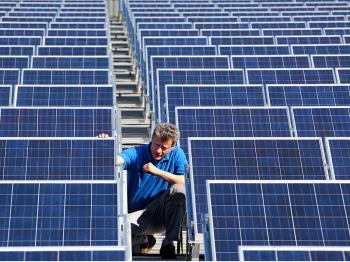Recently the first “green” Denny’s restaurant opened its doors in Joliet, Illinois. This new location in the southwest suburbs of Chicago is the first Denny’s restaurant in the United States to be LEED certified by the U.S. Green Building Council.
Leadership in Energy and Environmental Design (LEED) certification is a national standard sought by certain businesses that seek to demonstrate environmental friendliness in the design, operation, and construction of their facilities. To receive such a certification, the facility is rated in the areas of energy efficiency, water efficiency, materials used in the construction, building layout and design, and environmental quality.
What Makes This Denny’s ‘Green’
Special materials were used in the construction of the Joliet Denny’s. The roofing and the walls were made using insulation and reflective material that allows for twice the heating and cooling efficiency of conventional materials.
The heating, ventilation, and air-conditioning system exceeds the energy efficiency standards of most models. Additionally, this HVAC system uses top-of–the-line filters for maximum environmental control.
The restaurant has also saved in energy expenditure by selecting several pieces of ENERGY STAR rated equipment. The ice machine, reach-in cooler, and kitchen hoods—all ENERGY STAR rated—contribute to environmental friendliness.
Because lighting can unnecessarily use up quite a bit of wattage if left unchecked, steps were taken in the design to ensure optimum energy-efficient lighting. The restaurant was designed so that the windows face south. There were also six skylights installed in strategic locations to make maximum use of solar light. “The skylights are amazing,” owner and operator Joey Terrell explained. “They were Amish-made in Arthur, Illinois.”
In the dining room, LED lighting replaces standard 100-watt bulbs. Occupancy sensors were installed so that lights shut off automatically in areas that may be left unoccupied like storerooms, break rooms, and restrooms.
The entire restaurant’s water consumption was reduced by an estimated 42 percent by having low-flow water receptacles installed in the restrooms and dishwashing areas.
The kitchen has an amazing computerized “smart” fryer that automatically recycles and filters oil to possibly be used as biodiesel fuel or animal feed. The smart fryer also automatically adjusts temperatures to reduce gas output when not in use, thereby eliminating unnecessary loss of heat and additional cooling costs, and promoting overall energy savings.
Plans for More Green
Terrell explained that, being an accountant, he got the idea to go green when he was looking for ways to cut energy costs at one of his other locations. He said, “First we replaced the 100-watt lighting and installed aerators and low-flow water faucets.” After that, it was only a matter of a few months before he began to see a return. “I then began doing the research to find out other ways I could cut energy costs by becoming more green.”
Comparing his building to the cost of constructing a restaurant using conventional equipment and materials, Terrell mentioned, “We actually came out well under budget. We just want to get the word out and let people know how easy it can be, and how much money they can save.”
Terrell said they plan to seek LEED certification for another Denny’s under his ownership in Mokena, Illinois. As for future projects for the Joliet location, he says, “We’re currently looking into purchasing solar-powered parking lot lighting.”
“The city of Joliet has been very helpful,” Terrell said. “We looked into locations in several surrounding areas, but they all turned us down when we told them what we wanted to do.”
Joliet is about 35 miles southwest of Chicago. It has a population of about 300,000. Joliet is probably best known for its prison, the Joliet Correctional Center featured in scenes of several major motion pictures such as “The Blues Brothers” with Dan Akroyd and John Belushi, “Derailed” with Jennifer Aniston, and most recently the upcoming film “Public Enemy” starring Johnny Depp.
With Joliet being Chicago’s “little brother,” it’s rare that anything happens in Joliet that hasn’t already happened in Chicago. So, with pioneers like Terrell and his wife helping to bring ideas of green construction and business operation to smaller cities, along with local governments like Joliet’s that are willing to cooperate, we may look toward a brighter and greener future.



